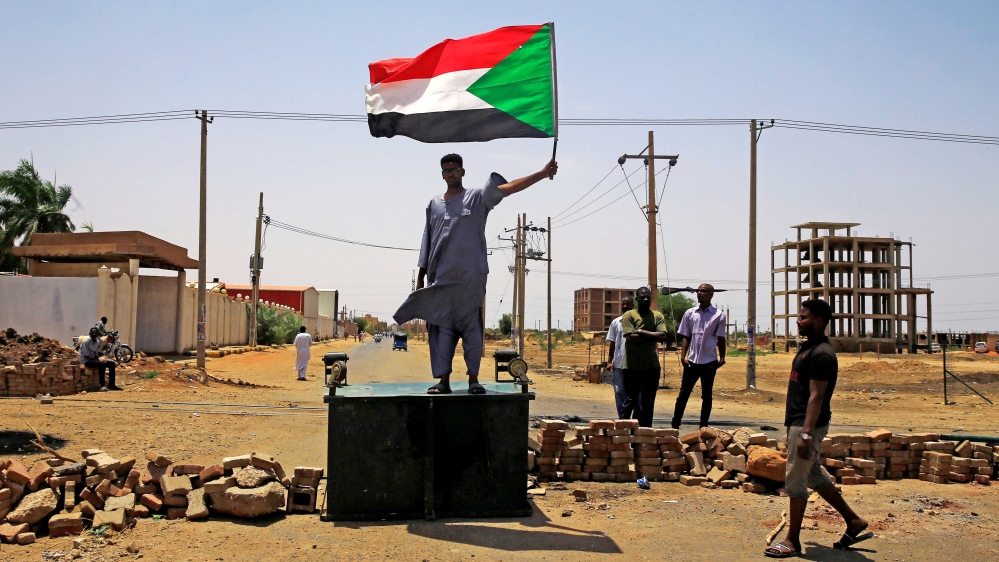SOURCE: AL JAZEERA NEWS
Sudan opposition says it accepts Ethiopia PM as mediator
Main alliance of opposition groups and protesters says it is open to Abiy Ahmed as mediator under certain conditions.
Sudan‘s main alliance of opposition groups and protesters says it accepts Ethiopia’s Prime Minister Abiy Ahmed as a mediator in their political deadlock with the Transitional Military Council (TMC) under certain conditions.
Among opposition demands are that the TMC take responsibility for the deadly dispersal of a protest sit-in on Monday, an international investigation into the incident is launched and political prisoners are released.
Abiy spent Friday in Sudan’s capital, meeting with a coalition of political groups and parties representing protesters. He also met the members of the military council in capital Khartoum.
READ MORE
#IAmTheSudanRevolution: Support for Sudan amid internet blackout
“The military and the people and the political forces need to act with bravery and responsibility in taking quick steps to a democratic, reconciliatory transitional period in the country,” Abiy said in a statement.
Abiy, 42, who took office in Ethiopia last year and introduced political and economic reforms, has won wide praise for his diplomatic skills, including brokering peace with his country’s neighbour and long-time foe Eritrea.
His trip came after the African Union (AU) suspended Sudan’s membership on Thursday following the deaths of at least 108 people in Monday’s deadly sit-in attack. More than 500 were wounded in the raid, according to the opposition-linked Central Committee of Sudanese Doctors.
A health ministry official, however, was quoted on Thursday as saying the death toll stood at 61.
Al Jazeera is unable to independently confirm the differing figures after its journalists were ordered not to report from the country.
‘State of terror’
Since the deadly assault, fearful Khartoum residents have remained largely indoors, leaving the streets virtually deserted at a time when Muslims are normally out celebrating the Eid al-Fitrholiday.
READ MORE
Sudan crackdown: All the latest updates
Soldiers from the feared Rapid Support Forces (RSF) – who have their origins in the notorious Janjaweed militia unleashed in the conflict in the western region of Darfur in 2003 and 2004 – have remained stationed in a number of the capital’s main squares.
Others have been seen out on patrol in their trademark pick-up trucks mounted with heavy machine guns or rocket launchers.
“We’re living in a state of terror because of sporadic gunfire,” one unidentified resident of south Khartoum told AFP.
The United Nations human rights office is seeking to send a monitoring team to Sudan to examine alleged violations during this week’s military crackdown, Rupert Colville, the agency’s spokesman told Al Jazeera on Friday.
“We have made a formal request to the government to get the UN human rights monitoring team into the country as quickly as possible.” Colville said.
“The Rapid Support Force should immediately be reigned in because this group has a chequered history. They appear to be at the centre of this week’s violence.” He added.
|
|
‘Political weight’
Speaking to Al Jazeera, Awol Allo – a lecturer specialising in East African politics at Keele University – said Ethiopia stands the best chance as a third party in mediating an agreement to halt the violence.
“If there are any external parties in the region who can bring the two sides together it would be Ethiopian prime minister and government,” Allo told Al Jazeera.
“That is partly because of Ethiopia’s own political weight in the AU … [and] also because Ethiopia has largely remained neutral and impartial so far in the confrontation between the military council and the forces for freedom and change.”
While Allo said there are limitations on Abiy’s mediation efforts, Ethiopia may be positioned to help the military reach an agreement that addresses the opposition’s demands.
“Ultimately … the best outline that is consistent with the demands of the revolution and international community is setting up a transitional government that gives the majority of the authority – the supreme authority – to a civilian body, not to the military,” said Allo.
|
|
